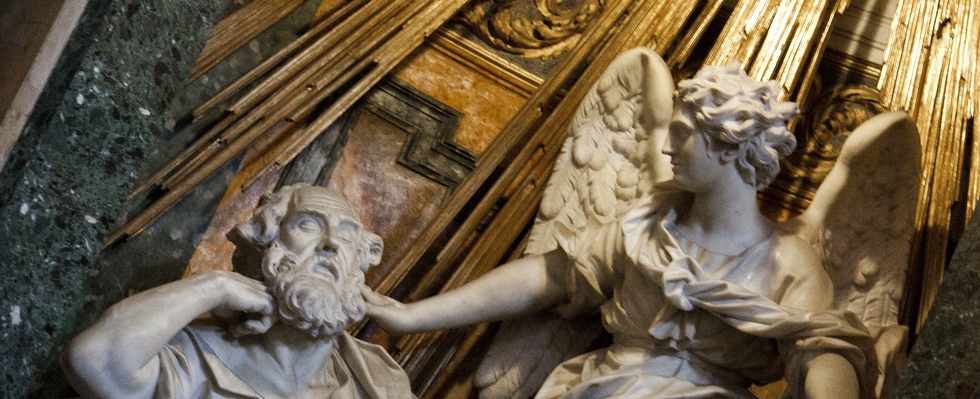St Joseph, Model of Heroic Fatherhood
Now when they had departed, behold, an angel of the Lord appeared to Joseph in a dream, saying, “Arise, take the young Child and His mother, flee to Egypt, and stay there until I bring you word; for Herod will seek the young Child to destroy Him.” Gospel of Matthew 2:13
The non-saccharine nature of the Gospel stories is a constant reminder of their veracity. Arguably, it is only their regular retelling from childhood that empties them, for some, of their shock value. No author of a fictitious hagiography would consider the raw facts of Jesus’s life to be in any way decorous for a deity-made-man.
Yet there they are. The facts. Incredible. Inconvenient. Immovable. Christ did spend his first New Year on this earth fleeing into exile in Egypt. Unlike much of the preceding story of the Incarnation, this dramatic episode temporarily draws our attention away from the maternal nature of Mary and towards the paternal nature of Joseph.
In doing so, it highlights another fact that is incredible, immovable yet also inconvenient for many moderns: all men are called to fatherhood.
“All of us, to exist, to become complete, in order to be mature, we need to feel the joy of fatherhood: even those of us who are celibate,” said Pope Francis in his daily homily 26 June 2013.
“Fatherhood is giving life to others, giving life…for us, it is pastoral paternity, spiritual fatherhood, but this is still giving life, this is still becoming fathers.”
The reality, however, is that fewer and fewer men are living out fatherhood than ever before, and fewer and fewer children are experiencing paternity.
A recent report by the Centre for Social Justice think-tank revealed that three million children in the United Kingdom are now growing up predominantly with their mothers. This is often due to unavoidable circumstances deserving of understanding, care and compassion. Such legitimate mitigation, though, cannot diminish the inherent need of a child to have a mum and a dad.
The absence of fathers in families is clearly linked to higher rates of poverty, youth crime and teenage pregnancy, says the think-tank report. It warns that the UK is experiencing a “tsunami” of family breakdown. In one neighbourhood in the Riverside area of Liverpool, there is no father present in 65 per cent of homes with dependent children.
While the natural fall-out from fatherless families is demonstratively deleterious, the supernatural fall-out is equally baleful.
“For those who have had the experience of an overly authoritarian and inflexible father, or an indifferent, uncaring, or even absent one, it is not easy to calmly think of God as a father or to confidently surrender themselves to him,” observed Pope Benedict XVI during a General Audience in January 2012.
He pointed out that “it isn’t always easy today to speak about fatherhood and, not having adequate role models, it even becomes problematic to imagine God as a father.”
In a recent book entitled Faith of the Fatherless, the American psychologist Paul Vitz attempts to draw a definite link between fatherlessness and atheism. He profiles dozens of prominent atheists, from Dawkins to Nietzsche to Robespierre, finding a clear common denominator as he goes: “In no case do we find a strong, beloved father with a close relationship with his son.”
So what is to be done? As with the sons of Jacob in the Old Testament and, subsequently, the Son of Man in the New Testament, the answer is clear: Ite ad Joseph – Go to Joseph.
It is in Saint Joseph that we find a model of manhood that embodies a heroic paternalism applicable both to those who live out their fatherhood generatively and also to those who pursue their paternity through the priesthood or other forms of apostolic celibacy. Indeed, Joseph himself falls into the latter category.
Joseph is prayerful, noble, loving, hard-working and always docile to the will of God. He adores Our Lady. He sacrifices everything for Christ.
In contemporary society, the generative father who doesn’t imitate Joseph can lapse into a range of behavioural patterns from demitting spiritual leadership in the family to neglecting the well-being of his wife. As the old aphorism recommends, the best gift a father can give his children is to love their mother.
Meanwhile, the spiritual father who does not imitate Joseph’s generosity can easily lapse into self-absorption and self-gratification. The result is an elimination of the fruitful paternalism to which all priests are called by Christ. The clerical state should never become a brotherhood of bachelors, still less a redoubt for those content with a comfortable, middle-class lifestyle.
The Catholic evangelist Matthew James Christoff states that “there will not be a New Evangelisation without the evangelisation of men”. If the forthcoming 2015 Synod on the Family can begin to grapple with that issue it will be doing the Church and wider society a great service indeed. Let us pray to Saint Joseph that it does.


